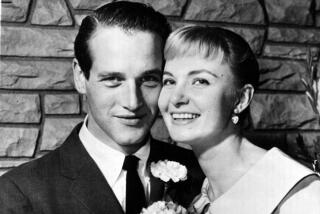Family Continues to Closely Guard President Cleveland’s Love Letters
- Share via
BALTIMORE — Their courtship flourished before the turn of the century, before e-mail, back when people in love showed their devotion with tender phrases in page after page of distinctive handwriting. Normally their letters might have been stored away without a second thought, evidence only of an age of innocence.
But these correspondents were President Grover Cleveland and the beloved who became his bride, Frances Folsom.
Their newly surfaced letters--described by one relative as poignant and gentle chronicles of the couple’s daily activities--have kicked up a debate about just how much of a president’s private life the public should be allowed to see.
On one side is a historical specialist at the Library of Congress, hoping to add what he considers an important find to the library’s collection of Cleveland papers.
On the other is Cleveland’s granddaughter to whom the letters belong, adamant about honoring her grandmother’s written wish that the correspondence be read only within her family or destroyed.
“They’re my letters, and . . . I will do what I see fit with them,” said Marion Cleveland Cohen of Baltimore. Whether that might include destruction, she did not say.
Presidential families have gone to great lengths before to preserve the privacy of their personal correspondence. Martha Washington burned personal letters from her husband, said John Sellers, the historical specialist who is seeking the Cleveland letters.
He doesn’t want that to happen again.
“There’s been kind of a pain in the hearts of American scholars ever since,” Sellers said.
He said the correspondence between the Clevelands “would really be revealing of their innermost character, their relationship . . . the depth of emotion between the two. It would actually confirm the character of the man, because he’s been given a very good rating on the moral side.”
That is no justification in the eyes of Cohen, to whom the letters have been passed.
From where she sits, her family is being harassed by outsiders who want a piece of something she considers unquestionably private. When Sellers called her recently to ask about the letters, she told him as much.
“I don’t think there’s anything very sensational in them,” Cohen said.
She said she found the inquiries about the letters “extremely irritating. . . . Some extraneous person has come in and asked for my personal things.”
Sellers said the Library of Congress plans to offer to keep the letters private for many years if Cohen will consider adding them to the collection. “Our primary concern is that they not be destroyed,” he said.
Cleveland’s forthright handling of scandal--the accusation that he had fathered an illegitimate child before he was married, and Cleveland’s support of the child financially even though his paternity was in doubt--has earned him praise.
“He’s more important than historians have acknowledged in the past,” said Sellers. “People are recognizing the strength and the ability to buck the popular mood, despite the politics of it.”
Rumors of a strongbox of letters between the Clevelands have circulated for years among presidential history buffs. It was only after the death in November 1995 of Cohen’s father, Francis Grover Cleveland, the Clevelands’ youngest son, that Sellers learned the rumors were true.
The private letters were tucked away in a box at Francis Grover Cleveland’s home in Tamworth, N.H.
The box included explicit written instructions from the former first lady, who died in 1947: to be destroyed or read only by direct descendants.
The letters have been on loan since 1995 to Charlotte Cleveland Look, another Cleveland granddaughter, who lives in Maine.
They date from 1884--the beginning of Cleveland’s first term--through his death in 1908, said Look, who has been reading and cataloging the correspondence.
Most of about 200 letters that Look has reviewed were written during the year before her grandparents’ wedding in 1886, while Frances traveled abroad after she graduated from Wells College.
The letters “are very gentle, sometimes quite loving,” said Look.
“Nothing in any way the way you think a courtship of these days would go. Literally, mostly the letters are talking about the activities that each is doing.
“He felt that she ought to really think it over, whether she wanted to be married to, one, an older man, and two, someone in that position in the White House,” she said. “That it was a big job she would have if she married him.”
It was an assignment Frances Folsom decided to accept. “Practically the day after she arrived back [to the United States] they were married,” Look said.
The wedding of Grover and Frances Cleveland was the first to take place in the White House.
While the Library of Congress has about 87,000 items from the presidential papers of Cleveland’s two terms, 90% of the material was written to him.
Presidential historians and collectors echo Sellers, saying the personal letters would show a long-hidden side of Cleveland.
Look said she understood why the Library of Congress would want to preserve the letters. She said reading them had been “a very poignant and moving experience.”
Sharon Farrell, who runs the Grover Cleveland Birthplace in Caldwell, N.J., said she was hoping for a middle ground.
“It’s often the public’s feeling they own a little piece of these political characters, and they don’t really,” Farrell said.
As for those who think that the Clevelands should make the letters available, Farrell said, she wished they “would just ease up a bit.”
More to Read
Sign up for Essential California
The most important California stories and recommendations in your inbox every morning.
You may occasionally receive promotional content from the Los Angeles Times.










